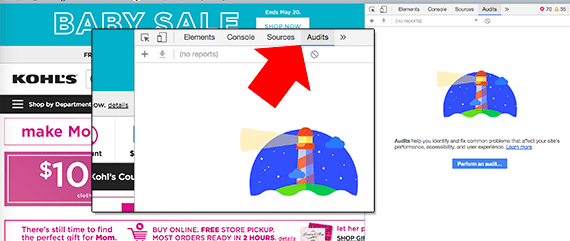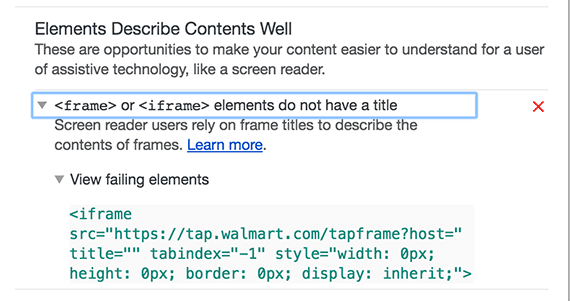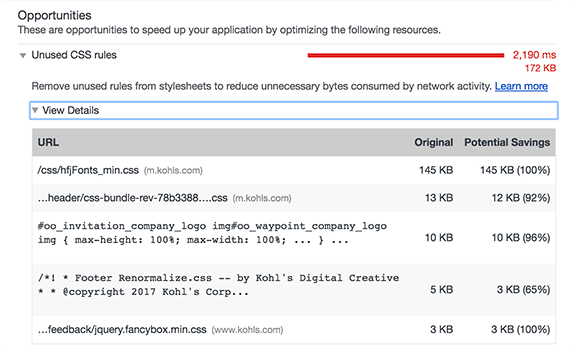Google Lighthouse: Monitor Site Performance, SEO, Accessibility
- Get link
- X
- Other Apps
Google Lighthouse: Monitor Site Performance, SEO, Accessibility
Lighthouse is Google’s free, open source, and automated site monitoring tool. It can help ecommerce businesses track site load times, accessibility, and search engine optimization.
Lighthouse is available in a few forms, including via current versions of the Google Chrome web browser.
An ecommerce owner or manager simply opens Chrome’s developer tools by alt-clicking anywhere on a web page, selecting “Inspect,” and then opening the “Audits” tab to find Lighthouse.

Lighthouse is available under the “Audits” tab of Chrome developer tools.
When an audit is run, Lighthouse will load the target website several times as it gathers information about site structure, tags, and performance. The tool puts a premium on mobile, so Lighthouse does its best to emulate a smartphone, even throttling the network connection to something like 3G and testing the page offline.
Improving Your Site
Lighthouse is meant to “help you identify and fix common problems that affect your site’s performance, accessibility, and user experience,” according to Google.
Put another way, the world’s largest search engine wants to use its extensive experience to give your company advice. Followed intelligently, Lighthouse’s findings could help your online store improve, and, perhaps, become easier for shoppers to find and use.

Lighthouse provides a score for each audit category and then offers actionable feedback to improve your site.
A Lighthouse audit will provide five categories of feedback, each with a ranking of zero to 100.
In many cases, Lighthouse provides details a business can use to improve its site.
As an example, a Lighthouse audit of Walmart.com conducted on May 7, 2018 found a few accessibility errors, including an iframe without a title attribute. Lighthouse points out that this missing title could make understanding the page relatively more difficult for shoppers using a screen reader and shows the specific iframe tag in question.

Lighthouse’s feedback is often specific enough to take action and improve your score.
Armed with this information a Walmart developer could add the required title attribute and improve the site’s accessibility.
Similarly, a Lighthouse audit of Kohls.com on May 7, 2018 identified several CSS declarations not used. The tool pointed to the specific style sheets in question and estimated how many bytes of data Kohl’s might save if it edited this CSS.

Kohl’s might save a few bytes by removing unused style declarations.
Using Lighthouse
There are at least three ways ecommerce businesses can use Lighthouse to help monitor and improve their sites.
First, use Lighthouse to test and enhance your stores. Open Lighthouse in the Chrome browser. Navigate to your company’s website. Conduct a Lighthouse audit, and work your way through the feedback, improving each point one by one.
Second, use Lighthouse to audit updates to your ecommerce website manually. When new code is deployed to a test server, open the test page in Chrome and conduct a Lighthouse audit to learn how the changes to your site will impact your various Lighthouse scores before deploying the new code to your production server.
Finally, an ecommerce business can automate Lighthouse audits. In addition to its inclusion in Chrome’s developer tools, Lighthouse is also available as a Node.js package. This means that it can be integrated into a continuous development workflow, so that any time an update is made to your site’s source code, Lighthouse can automatically test it for its impact on site performance. Code that would make your site significantly slower could be rejected or forced into a review.
As an example of Lighthouse automation, Google developers Eric Bidelman and Brendan Kenny demonstrated at Google I/O 2017 how a company might use Lighthouse with GitHub and testing tool Travis.
Decisions
Audits can help make decisions. If your ecommerce business uses Lighthouse, you still need to think through the potential changes. Sometimes your best performance options could be entirely different from Lighthouse’s suggestions. For example, instead of worrying about adding a title attribute to an iframe, you might remove the iframe altogethe
New Searchmetrics Lighthouse Ranking Factors Reports Deliver Custom Insights for Search Success
Combined insights from Google Lighthouse and Searchmetrics
Using each customer’s keywords to compare search performance in individual market against thousands of direct competitors
San Mateo, March 20, 2019 ‒ Searchmetrics is combining insights from Google Lighthouse with its own extensive search data to give SEO professionals a fully-customized, comprehensive report highlighting the Google ranking factors that matter most to their specific market. Each Lighthouse Ranking Factors report comes complete with concrete recommendations for improving search performance based on an analysis of how a site compares with top ranking competitors.
New Searchmetrics Lighthouse Ranking Factors reports deliver custom insights to drive search success
“This is so much more than just a simple SEO audit for your website,” explains Jordan Koene, CEO of Searchmetrics Inc.. “We take your keyword list and use Google‘s Lighthouse data − integrated with our data − to come up with an in-depth analysis of Lighthouse ranking factors and issues that are critical for your market. This helps us pinpoint a list of tailored recommendations to help you outperform your competition.”
To compile the reports Searchmetrics first evaluates each customer’s web pages using the Google Lighthouse open source tool. This provides real-time metrics and insights in areas such as technical performance (including speed-related factors), accessibility and SEO performance.
To this Searchmetrics adds in-depth analysis drawn from its own ranking factors data, courtesy of its continuously updated global search database. Using each customer‘s unique keyword set, the company generates a detailed breakdown of how the customer’s website performs against thousands of others. What are the most important ranking factors in that market segment? How does the customer’s site rate in those areas? And how can it improve?
After having pulled the Lighthouse data and combined it with Searchmetrics ranking data, the results are interpreted and analyzed by search and digital marketing experts from the Searchmetrics Digital Strategies Group. They clearly explain the metrics, filter the most relevant factors and outline the key steps that will drive improvements.
“Aimed at in-house SEO teams and agency professionals, Lighthouse Ranking Factors reports take the time and effort out of the data collection and analysis that is now essential for developing a next-generation search strategy and metrics,” explains Jordan. “Our experts sift through the data, identify the specific ranking factors that are important to the market you want to address and give you a check-list of key steps that your team can start working on right away.”
Customers are required to provide a list of up to 1,000 top keywords that defines their market. Searchmetrics will gather the data, perform an in-depth analysis and provide a comprehensive report detailing key metrics, insights and recommendations, complete with a management summary.
For more information visit: https://www.searchmetrics.com/lighthouse?utm_source=PR&utm_medium=external-media&utm_campaign=2019-03-lighthouse-ranking-factors-en
About SearchmetricsWe help you attract an online audience and boost results with content that uniquely matches user intent. Using the deep learning insights of the Searchmetrics Suite and Searchmetrics Content Experience platform, we navigate the shifting priorities of search engines and help you outrank your competition. Search has evolved into a data-driven field that requires powerful software to guide companies through discovery, briefing, optimization and measurement of engaging storytelling.
There’s only one platform that owns its data: Searchmetrics, the world’s #1 Search and Content Marketing Platform. We don’t rely on data from third parties and we’ve been studying search and content trends since 2005 − compiling the industry’s largest global and historical database.
Searchmetrics uncovers the opportunities and pitfalls of online marketing. Our award-winning Searchmetrics products bring search engine optimization and content creation together for the first time, offering marketers an ultimate platform for creating the moments that shape customers’ decisions and brand preferences. We offer competitive insights and hands-on consulting to help our customers create predictable returns in earned media. Our SEO Visibility Score − trusted by reputable media sources such as The New York Times, Bloomberg and The Guardian − reliably gauges your online presence. Searchmetrics reveals the connection between social media links and overall engagement, and its analytics make clear which content performs best.
Marcus Tober, one of the top 10 SEO minds in the world, leads Searchmetrics’ product development, driving innovations for more than a decade that improve results for content marketers. We have over 100,000 users worldwide, including respected brands such as T-Mobile, eBay and Siemens.
More information: www.searchmetrics.com.
Media Contact Uday RadiaCloudNine PR Agencyuradia@cloudninepr.com 44 (0)7940 584161
Free SEO Site Audit Tools
' ); h3_html = ''+cat_head_params.sponsor.headline+''; cta = ''+cat_head_params.cta_text.text+'→' atext = '
'+cat_head_params.sponsor_text+'
'; scdetails = scheader.getElementsByClassName( 'scdetails' ); sappendHtml( scdetails[0], h3_html ); sappendHtml( scdetails[0], atext ); sappendHtml( scdetails[0], cta ); // logo sappendHtml( scheader, '' ); sc_logo = scheader.getElementsByClassName( 'sc-logo' ); logo_html = '
ADVERTISEMENT
' ); if("undefined"!=typeof __gaTracker){ __gaTracker('create', 'UA-1465708-12', 'auto', 'tkTracker'); __gaTracker('tkTracker.set', 'dimension1', window.location.href ); __gaTracker('tkTracker.set', 'dimension2', 'seo' ); __gaTracker('tkTracker.set', 'contentGroup1', 'seo' ); __gaTracker('tkTracker.send', { 'hitType': 'pageview', 'page': cat_head_params.logo_url, 'title': cat_head_params.sponsor.headline, 'sessionControl': 'start' }); slinks = scheader.getElementsByTagName( "a" ); sadd_event( slinks, 'click', spons_track ); } } // endif cat_head_params.sponsor_logo
There are many free tools available for site auditing tests. These free SEO Site Auditing tools provide data that is complementary to paid site auditing tools. These SEO tools are well worth bookmarking regardless of whether you pay for a site auditing tools or not.Download here: Xenu Link Sleuth
Free SEO Website Crawler
Xenu Link Sleuth is the top choice for a free site crawler. It’s billed as a broken link checker. However Xenu can also output a report that gives you an overview of page titles, orphaned pages, redirects and pages that are not found. Xenu also does what it’s supposed to do, which is to check for both internal and external broken links.
Free Mobile SEO Tools
Mobile SEO is incredibly important. That’s why it’s important to be able to test what a search engine results page (SERPs) looks like in virtually any city in the world.
It’s also useful to be able to check what your web page looks like in the most popular mobile phones. Pages that look great tend to convert better.
Mobile Moxie provides a fully functional Mobile SEO Tools.
The Mobile Moxie SERPs checker shows you what the rankings looks like in a huge selection of mobile phone screens.
What makes this tool especially helpful is that it can localize to any city in the world. Thus, you can test what the mobile rankings are for someone located in any city in the world. This is great for local SEO or for client work where you’re not located in the client’s area.
There is also a Mobile Web Page Checker that can show you what your web page looks like in virtually any mobile phone. This will help you optimize your web page so that it converts the best across a wide range of mobile phones.
The tool is fully functional and can be used for free three times.Free tools here: Mobile Moxie Mobile SERPs Tool and Mobile Web Page Test
Free Website Security Audit Tools
Many SEOs don’t consider security as part of an SEO audit. Security only becomes an issue after a site’s been hacked and the rankings dropped.
In my opinion, website security should be a component of an SEO audit. A secure website is a major part of how well it ranks and encourages sales. That’s why I include a thorough security audit with every site audit I perform.
Free Blacklist Checker
Ultra Tools Blacklist CheckerThis tool checks if your website is listed on any blacklists. Being blacklisted can be an indication that your website is or was compromised. Being blacklisted can have a negative impact on the deliverability of your emails. That in turn impacts your email marketing and link building outreach.
If your site is no longer compromised, knowing that the site is blacklisted will help you contact the blacklist to have your site removed.
Free WordPress Vulnerability Scanner
WPScans WordPress Vulnerability ScannerThis free vulnerability scanner offers a quick but comprehensive scan of potential issues. Create the report then research whether or not your site has issues that need fixing. WPScans.com is a useful tool for beginning a security audit.
Free HTTPS Validator Tool
SSL Labs Security CheckerThe SSL Labs Security tool will spot misconfigurations and security holes in your HTTPS certificate implementation. Adding a server security certificate is touted as being easy. But that’s not always the case. This useful tool will help you diagnose hidden issues.
Free Drupal Security Scanner
Hacker Target Drupal Security ScannerThis comprehensive security scanner will highlight common issues with a Drupal based website.
Free Website Performance ToolsGzip Compression Checker
Check GZip Compression Tool The GZip Compression tool checks if your site is using GZip compression. Using compression allows your server to download your web pages quick.
YSlow Performance AuditThe free YSlow Performance Audit tool is a comprehensive performance audit scanner. It creates a report of 23 performance rules.
Free Duplicate Content Checker
Siteliner Duplicate Content CheckerThe free Siteliner duplicate content tool is a scanner provided by CopyScape (an anti-plagiarism service).
Siteliner is a good tool that can catch thin pages. Because the scanner counts navigation and footer content, a thin page will be highlighted by the tool. If a thin page exists, Siteliner will find it for you.
The scanner is limited to 250 pages. Nevertheless, it is useful to alert you to a possible problem with thin pages.
Free Web Page Checker
W3C Validator
The Worldwide Web Consortium is the organization concerned with creating HTML standards. The W3C Validator is a tool that checks whether the HTML is valid but it does so much more!
Tick the “Show Outline” option in order to see how your heading elements look to a search engine. The results can be eye opening and reveal issues with your website template.
The validator isn’t 100% reliable. It occasionally returns incomplete reports due to do perceived coding errors on the sites it is evaluating.
Free Web Page Speed Performance Tool
GTmetrix Speed and Performance Audit is another tool that will generate various benchmark scores. Use these scores to understand where your site can be improved.
Free Google Site Audit Tools
Google offers many SEO related tools. I wrote an article about the top Google SEO Tools. Here is a brief listing. The Google Search Console is very important and is worth mentioning. Here is a partial list of other useful tools provided by Google for auditing and inspecting web pages and websites.
Page Speed InsightsOffers web page speed feedback.
Structured Data Testing ToolThis tool helps diagnose issues with your structured data. However, just because the structured data validates does not mean it is absolutely correct. Make sure you are following Google’s Structured Data Guidelines.
The structured data validator does not verify if your structured data conforms with Google’s guidelines. Making a mistake with structured data could result in a manual penalty.
Web.Dev/LighthouseThis is the online version of Chrome Lighthouse. Lighthouse is Google’s Chrome Extension. The extension allows you to take advantage of Google’s site auditing tool. Web.dev allows you to do most of the same from a web browser.
Web.dev checks performance, accessibility, best practices and indexing issues (labeled as SEO).
Performance relates to speed. Best practices relates to factors such as whether the site is using HTTPS, security issues with JavaScript, HTML Document Type. The SEO report is not really about SEO but more about how well the site can be indexed. Accessibility is self-explanatory.
- Get link
- X
- Other Apps
Comments
Post a Comment